The Overlooked Warning Signs of Thyroid Problems
Thyroid disorders affect an estimated 20 million Americans, yet many cases remain undiagnosed due to subtle symptoms. The thyroid gland, a vital part of the endocrine system, regulates metabolism, growth, and energy. Despite its importance, delayed diagnosis is common, causing significant health impacts. According to the CDC, early detection is crucial, but misinterpretation of warning signs continues to hinder timely treatment and management.
1. Persistent Fatigue

One of the most common yet overlooked symptoms of thyroid problems is persistent fatigue. Thyroid hormones, particularly thyroxine (T4) and triiodothyronine (T3), play a critical role in regulating metabolism and overall energy levels. When the thyroid gland underproduces these hormones—a condition known as hypothyroidism—metabolic processes slow down, leading to a constant feeling of tiredness regardless of sleep or rest. Conversely, an overactive thyroid (hyperthyroidism) can also disrupt normal sleep patterns, resulting in exhaustion.
For example, someone experiencing ongoing tiredness may attribute it to a busy schedule or stress at work. However, if this fatigue persists for weeks or months, and is not relieved by adequate sleep, it may signal an underlying thyroid disorder. According to the Endocrine Society, thyroid-related fatigue is often described as a profound lack of energy that interferes with daily activities, rather than the normal tiredness experienced after exertion.
If you notice that your fatigue is unrelenting, worsens over time, or is accompanied by other symptoms such as muscle weakness or difficulty concentrating, it is important to consult a healthcare provider for thyroid function testing. Early recognition can make a significant difference in treatment outcomes.
2. Unexpected Weight Changes

The thyroid gland plays a central role in regulating metabolism, the process by which your body converts food into energy. When thyroid hormone levels are imbalanced, this metabolic process can dramatically shift, leading to unexplained weight changes. Hypothyroidism, or an underactive thyroid, slows metabolism and often results in gradual weight gain, even when eating habits remain unchanged. On the other hand, hyperthyroidism, or an overactive thyroid, accelerates metabolism, sometimes causing significant weight loss despite normal or increased food intake.
For many, these weight fluctuations are easily mistaken for the effects of diet, aging, or lifestyle changes. For example, someone may attribute steady weight gain to reduced physical activity or stress, overlooking the possibility of an underlying thyroid issue. Similarly, unexpected weight loss might initially seem like a positive change but can signal a more serious health concern if not intentional. The Mayo Clinic notes that such changes, especially when accompanied by other symptoms like fatigue or mood shifts, warrant further investigation.
If you experience persistent, unexplained weight gain or loss, particularly if it is resistant to lifestyle modifications, it is advisable to consult your healthcare provider and request thyroid function tests. Early detection can prevent complications and help restore healthy metabolic balance.
3. Swelling at the Base of the Neck

One of the more visible but frequently overlooked symptoms of thyroid problems is swelling at the base of the neck, commonly known as a goiter. This swelling results from an enlarged thyroid gland, which may occur due to both hypothyroidism and hyperthyroidism, as well as other thyroid disorders such as thyroid nodules or inflammation. According to the American Thyroid Association, goiters can develop gradually and are often not painful, which can make them difficult to detect without careful observation.
A compelling example is the story of an individual who only noticed swelling in their neck after seeing themselves in recent photographs—something they had missed in day-to-day life. Friends or family may also point out such changes before the person themselves becomes aware. Because goiters can vary in size, the swelling might be subtle or more pronounced, sometimes causing a feeling of tightness, difficulty swallowing, or changes in voice.
It is important to periodically check for changes at the base of your neck in the mirror or with the help of a loved one. If you observe any new swelling, asymmetry, or a visible lump, it is essential to seek medical evaluation promptly, as some thyroid swellings may require further testing or treatment.
4. Changes in Heart Rate
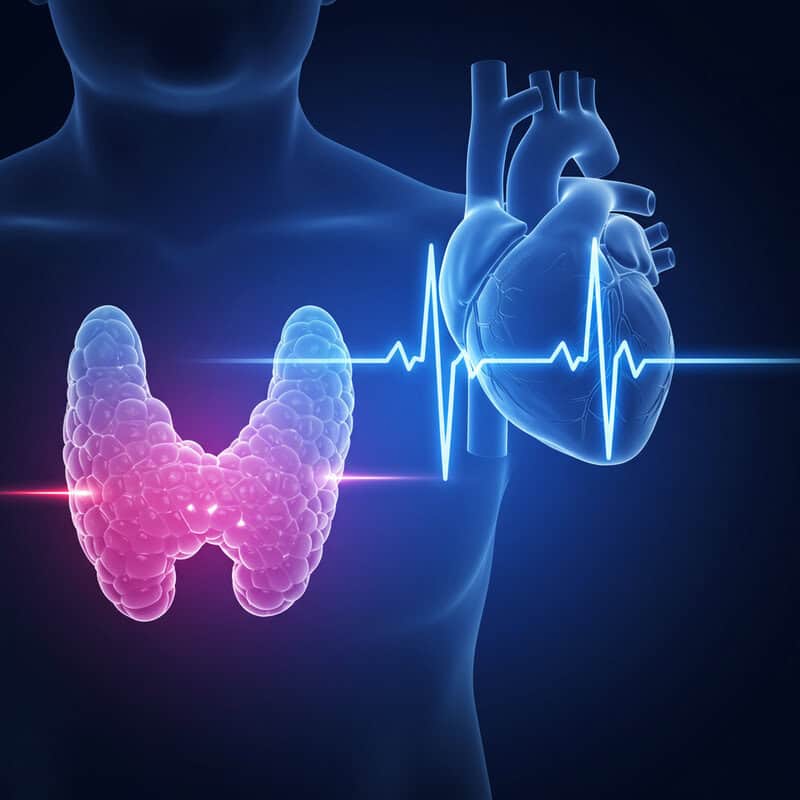
The thyroid gland has a significant impact on the cardiovascular system, particularly in regulating heart rate. Thyroid hormones influence how quickly or slowly your heart beats, and imbalances can result in noticeable changes. In cases of hyperthyroidism, excessive hormone production can cause a rapid heartbeat (tachycardia), palpitations, or even irregular heart rhythms. Conversely, hypothyroidism may lead to a slower than normal heart rate (bradycardia), fatigue, or dizziness.
For example, someone with hyperthyroidism might experience sudden episodes of racing heartbeats or a fluttering sensation in the chest, sometimes mistaken for anxiety or the aftereffects of caffeine. On the other hand, an individual with hypothyroidism may notice their pulse feels unusually slow or weak, and they might feel easily winded during routine activities. These heart-related symptoms are often subtle at first, but can become more pronounced as thyroid dysfunction progresses.
It is advisable to regularly monitor your heart rate, especially if you notice unusual sensations, persistent palpitations, or unexplained slow pulse. If these symptoms persist or are accompanied by other warning signs such as fatigue or shortness of breath, consult a healthcare professional and request thyroid function testing. Early intervention can prevent serious cardiovascular complications.
5. Sensitivity to Cold or Heat

Thyroid hormones are essential for regulating the body’s internal temperature, and imbalances can significantly alter your tolerance to climate changes. In hypothyroidism, where thyroid hormone levels are low, metabolism slows down, which reduces the amount of heat your body generates. This often results in heightened cold intolerance, where even moderate temperatures can feel uncomfortably chilly. Individuals may start wearing extra layers, using blankets more frequently, or feeling cold when others are comfortable.
In contrast, hyperthyroidism accelerates metabolic processes, making the body produce more heat. This can manifest as heat intolerance, where affected individuals feel excessively warm, sweat more than usual, or seek out cooler environments even when others are comfortable. According to the EndocrineWeb, these changes in temperature sensitivity are among the early clues of thyroid dysfunction, but are frequently overlooked or dismissed as normal aging or seasonal fluctuations.
If you notice a persistent need to adjust the thermostat, dress differently from those around you, or experience discomfort in environments that were previously tolerable, consider discussing these changes with your healthcare provider. Temperature intolerance, especially if sudden or severe, may warrant thyroid function testing to rule out underlying endocrine issues.
6. Hair Thinning or Loss

Thyroid hormones play a vital role in the growth and maintenance of hair follicles. When thyroid function is disrupted—either by hypothyroidism or hyperthyroidism—the normal hair growth cycle is affected. As a result, more hair follicles may enter the resting (telogen) phase prematurely, leading to increased shedding and noticeable hair thinning or loss. This symptom can be gradual, making it difficult to recognize until there is a significant reduction in hair volume or a change in hair texture.
An example might involve someone noticing more hair accumulating in their brush or shower drain, or unexpected patches of thinning along the hairline or scalp. Sometimes, individuals assume these changes are due to stress, aging, or seasonal shifts, overlooking the possibility of a thyroid problem. According to the American Academy of Dermatology Association, thyroid-related hair loss can affect not only the scalp but also the eyebrows and other body hair.
It is important to pay attention to sudden changes in hair density, texture, or the appearance of bald spots. If you observe persistent or unexplained hair loss, especially when accompanied by other potential thyroid symptoms, seek evaluation from a healthcare provider and request thyroid function tests for proper diagnosis.
7. Dry Skin and Brittle Nails

Thyroid hormones contribute to maintaining healthy skin and nails by supporting cellular turnover and moisture retention. When thyroid function is compromised, particularly in hypothyroidism, the skin can become unusually dry, rough, or scaly. Nails may also become brittle, thin, or develop ridges and split easily. These changes occur because a slowed metabolism affects the body’s ability to nourish and repair skin and nail tissues efficiently.
For example, someone struggling with persistent dry skin might try various moisturizing creams and lotions with little or no improvement. Despite their efforts, the dryness, flakiness, or itchiness continues, sometimes spreading to elbows, knees, or the soles of the feet. Similarly, nails may start to peel or break more easily, causing discomfort and cosmetic concerns. According to the Harvard Health Publishing, these symptoms are often subtle and may be misattributed to environmental factors or aging, delaying proper diagnosis.
If you notice ongoing skin dryness or nail brittleness that does not improve with typical self-care, it is important to monitor these changes and mention them to your healthcare provider. Persistent symptoms, especially when coupled with other signs of thyroid dysfunction, may warrant thyroid function testing.
8. Menstrual Irregularities
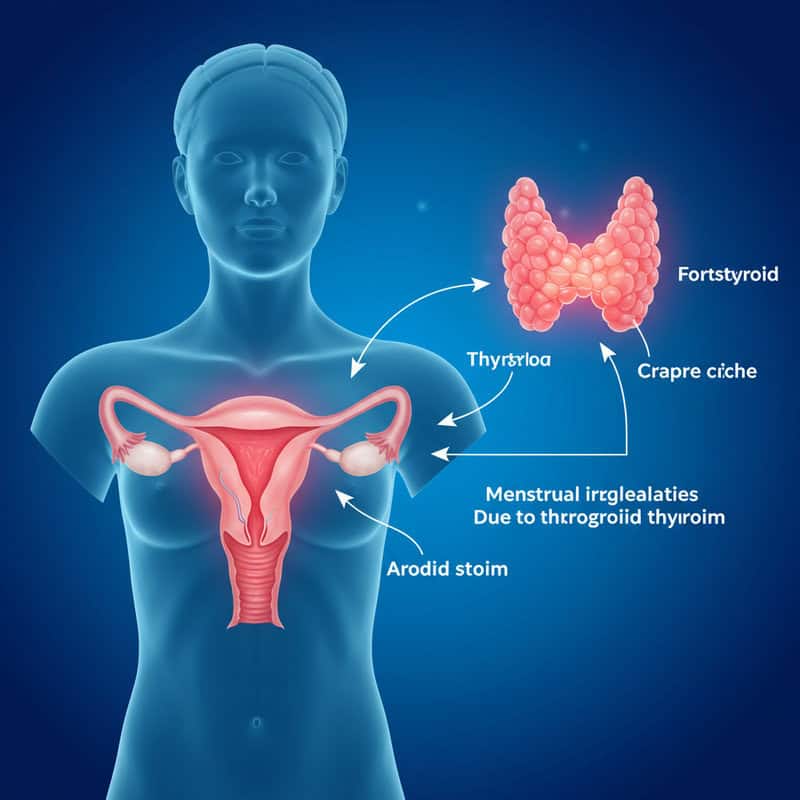
Thyroid hormones play a crucial role in regulating the menstrual cycle by interacting with reproductive hormones that control ovulation and menstruation. When thyroid function is abnormal, it can lead to a range of menstrual irregularities. In hypothyroidism, women may experience heavier, more frequent, or prolonged periods (menorrhagia). Conversely, hyperthyroidism may cause lighter, less frequent, or even absent periods (amenorrhea). These disruptions are often mistaken for common menstrual disorders such as polycystic ovary syndrome (PCOS) or perimenopause, leading to delays in proper diagnosis.
For instance, a woman might notice her periods becoming unusually heavy, lasting longer than usual, or occurring with irregular timing. She may attribute these changes to stress, age, or hormonal fluctuations. However, such persistent menstrual changes can be a direct result of thyroid dysfunction. According to the Office on Women’s Health, undiagnosed thyroid disorders are a significant cause of menstrual issues and can even affect fertility if left untreated.
It is important to track your menstrual cycle and note any ongoing irregularities, such as changes in flow, frequency, or duration. If these irregularities persist or are accompanied by other symptoms of thyroid problems, consult your healthcare provider for a thorough evaluation, including thyroid function testing.
9. Constipation or Diarrhea
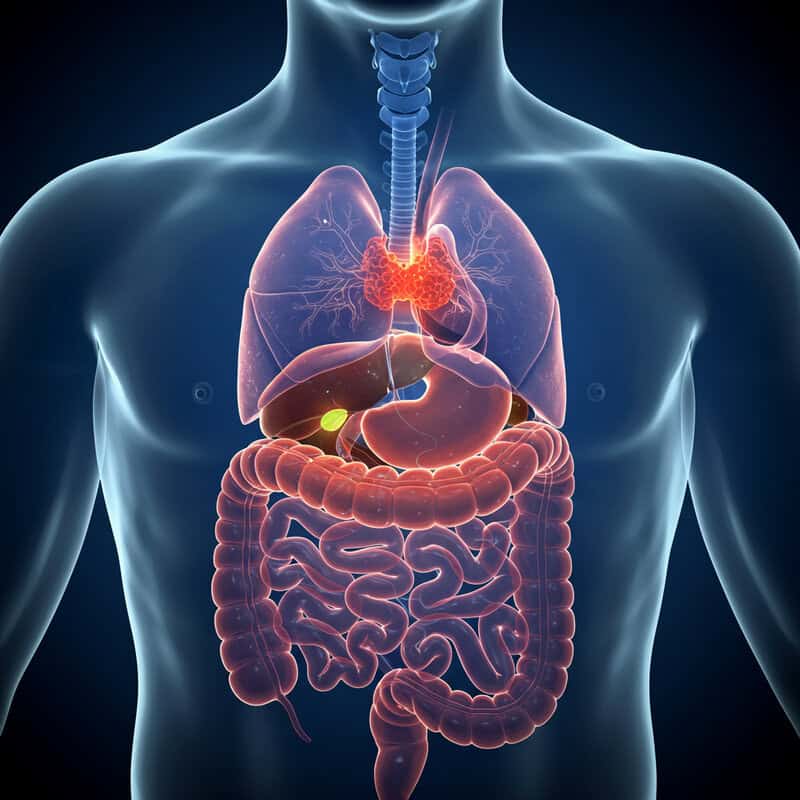
The thyroid gland significantly influences the digestive system by regulating the speed at which the intestines process food. When thyroid hormone levels are low, as in hypothyroidism, metabolism slows, often resulting in chronic constipation. This occurs because the digestive tract becomes sluggish, making it more difficult for waste to pass through the colon efficiently. Conversely, hyperthyroidism can accelerate digestive processes, leading to frequent bowel movements or diarrhea due to increased intestinal activity.
For example, someone with untreated hypothyroidism might experience weeks of infrequent, hard-to-pass stools despite a healthy diet and adequate hydration. Over-the-counter remedies may provide minimal relief, and the problem can persist or worsen over time. On the other hand, an individual with hyperthyroidism might find themselves making numerous urgent trips to the bathroom throughout the day. According to the National Institute of Diabetes and Digestive and Kidney Diseases (NIDDK), these digestive symptoms are often overlooked or mistaken for dietary issues or stress.
If you experience persistent constipation or diarrhea that does not respond to typical interventions, or notice a significant change in your normal bowel habits, it is important to discuss these symptoms with your healthcare provider. Thyroid function testing may reveal an underlying hormonal imbalance affecting your digestive health.
10. Memory Lapses or Brain Fog
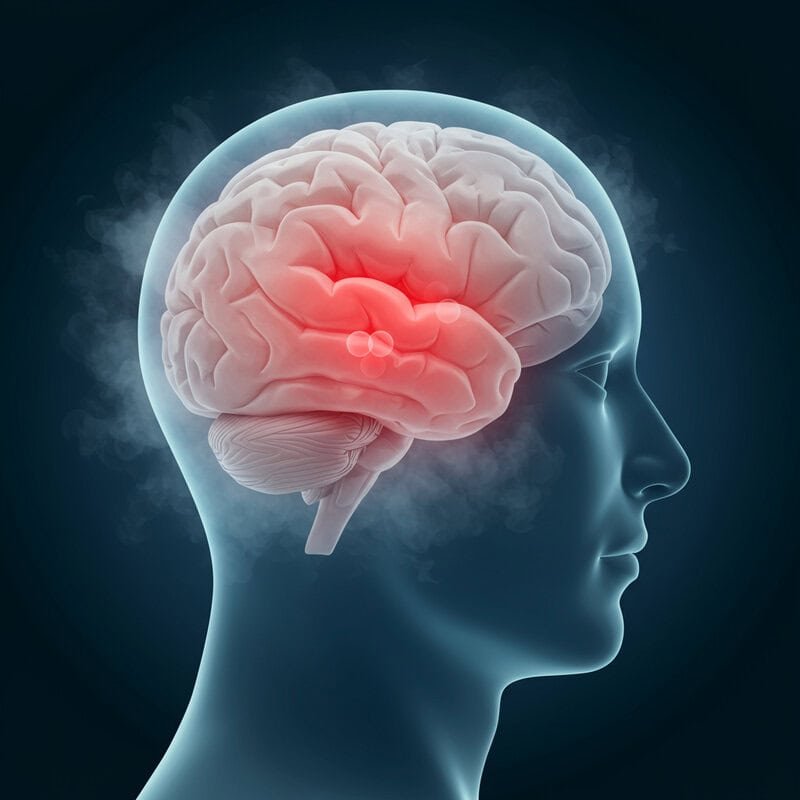
Thyroid hormones are crucial for healthy brain function, influencing concentration, memory, and mood. When thyroid dysfunction occurs—either with hypothyroidism or hyperthyroidism—it can lead to noticeable cognitive effects, often described as memory lapses or brain fog. Low thyroid hormone levels slow neural processing, making it harder to concentrate, remember details, or think clearly. Conversely, excess thyroid hormones may cause anxiety or distractibility, further affecting mental clarity.
For example, someone with undiagnosed hypothyroidism might forget important appointments, struggle to recall recent conversations, or feel mentally sluggish at work. These symptoms are often dismissed as normal aging, stress, or lack of sleep, which can delay proper evaluation and treatment. The Johns Hopkins Medicine highlights that persistent cognitive symptoms may be reversible with appropriate thyroid management.
If you notice ongoing issues with forgetfulness, difficulty focusing, or a sense of mental cloudiness, it is important to track these changes and discuss them with your healthcare provider. Documenting the frequency and severity of these symptoms can aid in determining whether thyroid function testing is necessary and guide further evaluation and care.
11. Mood Changes
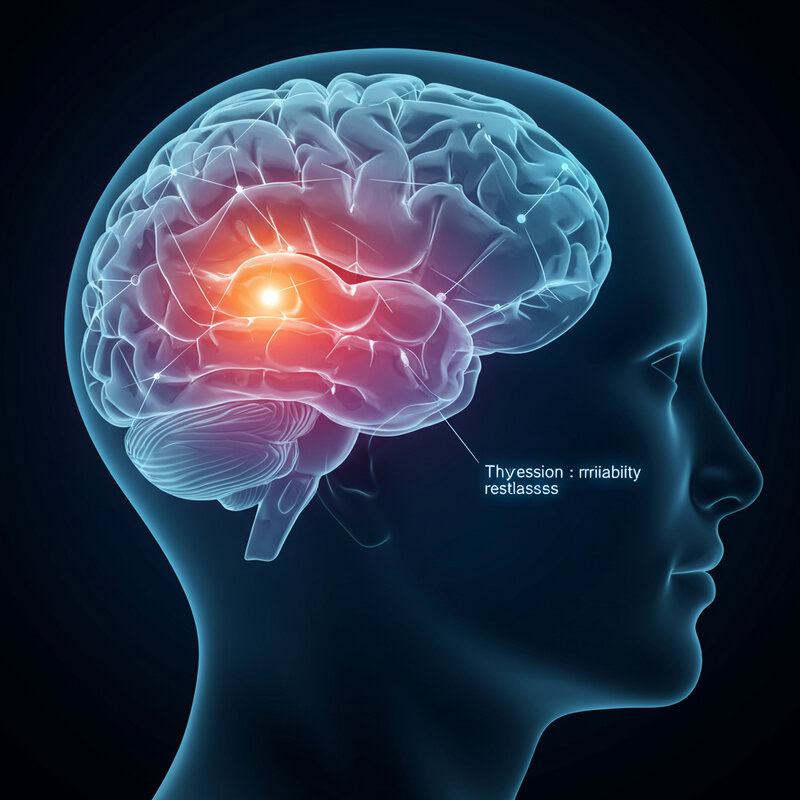
Thyroid hormones are intimately connected to mental health, playing a vital role in regulating mood and emotional stability. When thyroid levels are out of balance, people may experience significant shifts in mood. Hypothyroidism is commonly associated with symptoms of depression, low motivation, and irritability, while hyperthyroidism is more often linked to anxiety, restlessness, and mood swings. These emotional changes often mimic those seen in primary mood disorders, such as clinical depression or generalized anxiety disorder, making them easy to misattribute.
For instance, someone with an undiagnosed thyroid issue may find themselves feeling persistently down, overwhelmed, or emotionally numb, despite no clear trigger. Alternatively, they might experience heightened nervousness, agitation, or even panic attacks. According to the Everyday Health guide to thyroid and mood, thyroid-related mood changes often persist despite typical interventions for mental health, such as therapy or lifestyle changes.
If you notice ongoing or unexplained changes in your mood—especially when accompanied by other symptoms of thyroid dysfunction—it is important to keep track of their frequency and intensity. Persistent or worsening emotional symptoms should prompt a conversation with your healthcare provider and may warrant thyroid testing as part of a comprehensive evaluation.
12. Muscle Weakness or Joint Pain

Thyroid dysfunction can significantly impact muscle strength and joint health. Both hypothyroidism and hyperthyroidism may cause muscle weakness, cramps, stiffness, and joint pain. In hypothyroidism, slowed metabolism leads to poor muscle energy and protein turnover, resulting in weakness and aches, especially in the shoulders, arms, hips, and thighs. Hyperthyroidism, meanwhile, can cause muscle breakdown (thyrotoxic myopathy), leading to similar symptoms but often with more rapid onset.
For example, someone may notice increasing difficulty climbing stairs, standing from a seated position, or lifting everyday objects, even if they have not changed their exercise routine. These symptoms can be misattributed to aging, overuse, or minor injuries. According to the Arthritis Foundation, thyroid-related muscle and joint symptoms are frequently underrecognized, leading to delays in diagnosis and treatment.
If you experience persistent, unexplained muscle weakness, joint pain, or stiffness—especially if it interferes with daily activities—it is important to document these changes and consult your healthcare provider. Such symptoms, when present alongside other warning signs, may indicate the need for thyroid function testing and further evaluation.
13. High Cholesterol Levels
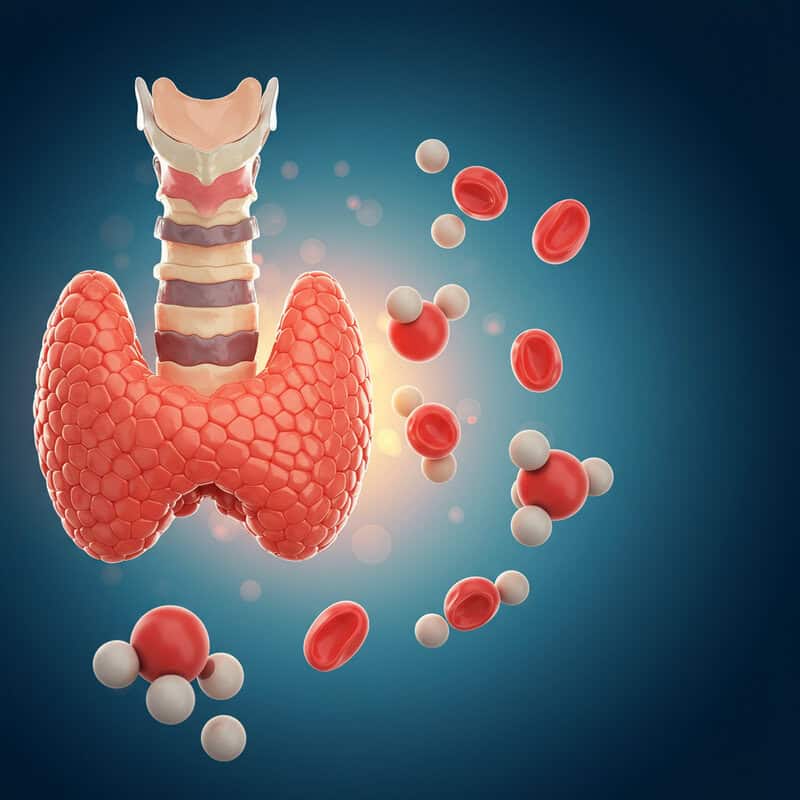
The thyroid gland exerts a powerful influence on cholesterol metabolism. Thyroid hormones help regulate the breakdown and removal of cholesterol from the bloodstream. When thyroid hormone levels are low, as in hypothyroidism, the body’s ability to metabolize cholesterol slows down, often resulting in elevated cholesterol levels, particularly low-density lipoprotein (LDL) or “bad” cholesterol. This effect can occur even in individuals with healthy diets and exercise habits.
For instance, a person might be surprised to find unexpectedly high cholesterol numbers during routine blood work, despite no significant changes in lifestyle or family history of hyperlipidemia. According to the Cleveland Clinic, undiagnosed hypothyroidism is a common and often hidden cause of secondary hypercholesterolemia, and can increase the risk of heart disease if left untreated.
If you receive a diagnosis of high cholesterol or your cholesterol levels suddenly increase without an obvious cause, it is wise to ask your healthcare provider to evaluate your thyroid function. Early identification and treatment of underlying thyroid issues can not only help manage cholesterol but also improve overall heart and metabolic health.
14. Hoarseness or Voice Changes
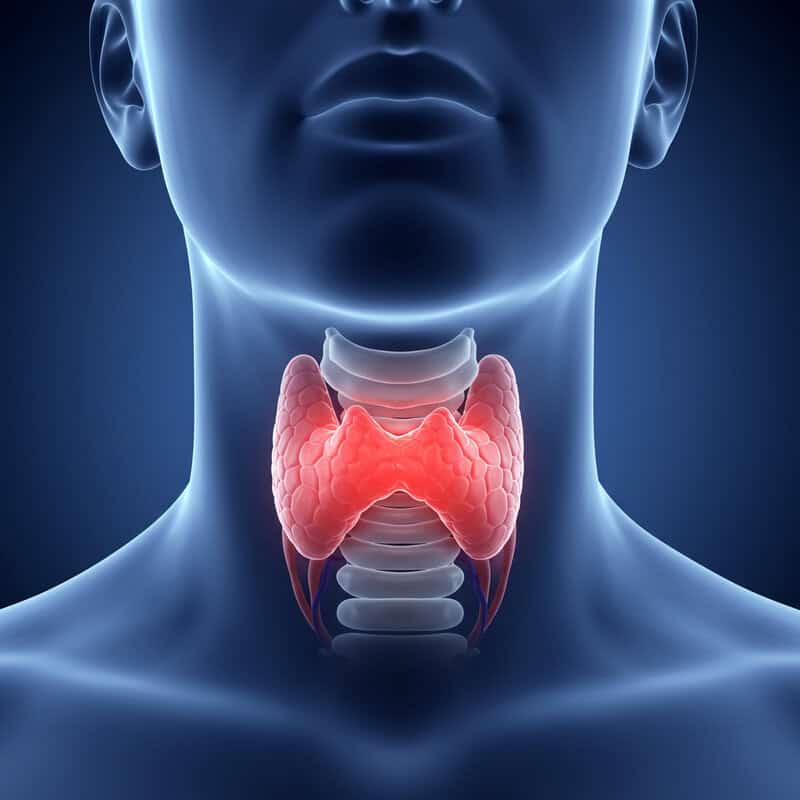
The thyroid gland is located at the base of the neck, close to the vocal cords and larynx. When the thyroid becomes enlarged due to conditions such as a goiter, thyroid nodules, or inflammation, it can exert pressure on the surrounding structures, including the voice box. This pressure may lead to hoarseness, a raspy or weak voice, or other unexpected changes in vocal quality. In some cases, these symptoms develop gradually and go unnoticed until they become persistent or interfere with communication.
For example, someone may develop chronic hoarseness that lingers beyond a typical cold or allergy season. They might find themselves clearing their throat frequently or notice their voice becoming softer, deeper, or more strained over time. According to the American Academy of Otolaryngology-Head and Neck Surgery Foundation, persistent hoarseness lasting more than two weeks should not be ignored, as it may be a sign of thyroid enlargement or another underlying health issue.
If you experience ongoing changes in your voice, especially if accompanied by a lump or swelling in the neck, difficulty swallowing, or a sensation of tightness, it’s important to discuss these symptoms with your healthcare provider. Thyroid evaluation may be necessary to determine the cause and guide appropriate treatment.
15. Depression or Anxiety
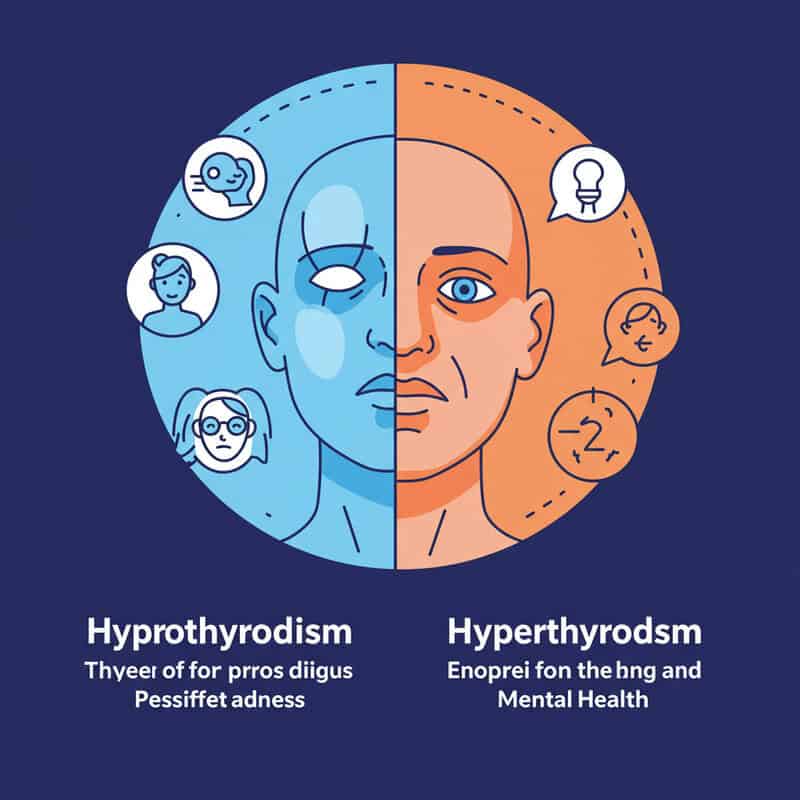
Thyroid dysfunction can have a profound impact on mental health, often manifesting as depression or anxiety. Both hypothyroidism and hyperthyroidism can trigger mood disturbances, but the patterns may differ. Hypothyroidism is frequently associated with low mood, persistent sadness, loss of interest, and fatigue, symptoms that closely resemble primary depressive disorders. Hyperthyroidism, on the other hand, is more often linked to anxiety, restlessness, irritability, and trouble relaxing—similar to generalized anxiety disorder.
Unlike primary depression or anxiety, mood changes caused by thyroid imbalances may be accompanied by other physical symptoms, such as weight changes, fatigue, or temperature intolerance. For instance, someone with new-onset anxiety might also notice an unusually fast heart rate or excessive sweating, while a person experiencing depression could struggle with unexplained fatigue and muscle aches. According to the National Institute of Mental Health, thyroid disorders are an important but often overlooked cause of mood disturbances.
If you or a loved one develops persistent symptoms of depression or anxiety, particularly if these are new or resistant to standard treatments, consider requesting a thyroid evaluation. Identifying and treating an underlying thyroid disorder can often lead to substantial improvement in mental health and overall well-being.
16. Decreased Libido

Thyroid hormones play a significant role in regulating many aspects of sexual function, including libido. When thyroid levels are disrupted—whether through hypothyroidism or hyperthyroidism—individuals may experience a decreased interest in sexual activity. Low thyroid hormone levels can lower energy, cause mood disturbances, and interfere with the production of sex hormones like estrogen and testosterone, all of which contribute to diminished sexual desire. Hyperthyroidism can also negatively affect libido, often through anxiety, irritability, and hormonal imbalances.
For example, someone may notice a gradual decline in sexual interest or arousal, which might be attributed to stress, relationship issues, or aging. However, when these changes persist and are accompanied by other symptoms such as fatigue, weight changes, or mood fluctuations, thyroid dysfunction could be an underlying cause. According to the National Institutes of Health, both men and women with thyroid disorders frequently report reduced libido and sexual satisfaction.
If you experience ongoing changes in your sexual health, including decreased interest, arousal difficulties, or other related concerns, consider discussing these with your healthcare provider. Tracking these symptoms alongside other potential warning signs can help guide appropriate thyroid testing and treatment.
17. Fertility Difficulties

The thyroid gland plays a crucial role in reproductive health and fertility for both men and women. Thyroid hormones are involved in regulating menstrual cycles, ovulation, and the production of reproductive hormones such as estrogen and progesterone. Both hypothyroidism and hyperthyroidism can disrupt these processes, leading to fertility difficulties such as irregular cycles, anovulation, or early miscarriage. Men may also experience reduced sperm quality and motility due to thyroid dysfunction.
For instance, a couple experiencing unexplained infertility may undergo extensive testing and lifestyle modifications without success, only to later discover an underlying thyroid disorder. Women might report irregular or absent periods, while men may find low libido or erectile dysfunction contributing to conception challenges. According to the American Society for Reproductive Medicine, thyroid dysfunction is a known but sometimes overlooked cause of infertility, and correcting thyroid imbalance can often restore normal reproductive function.
If you are having difficulty conceiving, it is important to request a thorough thyroid screening as part of your fertility workup. Identifying and treating thyroid disorders early can improve the chances of successful conception and support a healthy pregnancy.
18. Puffiness in the Face or Eyes

Facial puffiness, particularly around the eyes, is a subtle but important warning sign of thyroid dysfunction. In hypothyroidism, the body retains excess fluid, leading to swelling in the tissues—most noticeably in the face, eyelids, and under the eyes. This swelling, known as myxedema, can develop gradually and be mistaken for normal aging, allergies, or lack of sleep. In some cases of hyperthyroidism, especially Graves’ disease, inflammation causes bulging or swelling around the eyes, known as Graves’ ophthalmopathy.
Real-world cases often involve individuals noticing their face appears fuller or puffier in photographs, or family members comment on persistent swelling around their eyes. Some report difficulty wearing rings or noticing indentations from socks, which can indicate fluid retention. According to the American Thyroid Association, facial and eye changes can be among the earliest signs of thyroid disease, yet are frequently overlooked or attributed to benign causes.
If you observe new or worsening puffiness in your face or around your eyes, especially when accompanied by other symptoms of thyroid dysfunction, pay close attention and consult your healthcare provider. Early evaluation and intervention can prevent progression and improve overall health outcomes.
19. Excessive Sweating

Excessive sweating, or hyperhidrosis, is a common yet frequently overlooked sign of hyperthyroidism. When the thyroid is overactive, it increases the body’s metabolism, generating more heat and triggering sweat glands to work overtime. This leads to sweating that is often disproportionate to activity level, environmental temperature, or emotional stress. Unlike normal sweating that occurs during exercise or hot weather, thyroid-related sweating can happen unexpectedly—even in cool environments or during periods of rest.
For example, someone with undiagnosed hyperthyroidism might notice that they wake up drenched in sweat, need to change clothes multiple times a day, or experience clammy hands and feet without explanation. These symptoms may be dismissed as anxiety, hormonal changes, or simply a tendency to “run warm.” According to the Mayo Clinic, persistent, unexplained sweating—especially when associated with other signs of thyroid dysfunction—warrants further evaluation.
If you find yourself sweating excessively with little or no exertion, or if your sweating patterns have changed significantly from what is normal for you, it is important to take note. Documenting these changes and discussing them with your healthcare provider can help determine if thyroid testing is necessary.
20. Hand Tremors

Thyroid hormones have a direct impact on the nervous system, and imbalances—particularly in hyperthyroidism—can lead to hand tremors or shaking. When thyroid hormone levels are elevated, they overstimulate nerves, increasing sensitivity and excitability. This can result in fine, rapid tremors, most noticeable in the hands and fingers. The tremors may be subtle at first, but can gradually become more pronounced, interfering with daily activities such as writing, holding utensils, or pouring liquids.
For example, someone with undiagnosed hyperthyroidism might notice their hands trembling when holding a cup of coffee or attempting precise tasks. These tremors are often mistaken for anxiety, caffeine effects, or simple nervousness. However, according to the Mount Sinai Health Library, persistent, unexplained hand trembling—especially when accompanied by other symptoms such as rapid heartbeat, weight loss, or excessive sweating—should prompt evaluation for thyroid dysfunction.
If you develop new or worsening tremors, particularly if they are continuous and not related to obvious causes, pay close attention to their frequency and severity. Keeping a record and sharing this information with your healthcare provider can help in early identification of thyroid-related nerve issues and guide appropriate testing and treatment.
21. Sleep Disturbances

Thyroid dysfunction frequently disrupts normal sleep patterns, but the nature of these disturbances varies depending on whether thyroid hormone levels are high or low. In hyperthyroidism, excess thyroid hormone stimulates the nervous system, leading to insomnia, difficulty falling or staying asleep, and frequent nighttime awakenings. Individuals may feel restless and find their mind racing, making it hard to relax at bedtime. Conversely, hypothyroidism can cause excessive sleepiness, where a person feels drowsy throughout the day and may sleep longer than usual but still wake feeling unrefreshed.
For example, someone with hyperthyroidism might lie awake for hours, unable to drift off despite exhaustion, while another with hypothyroidism may nod off easily during meetings or while watching television. These patterns are often mistaken for stress, poor sleep hygiene, or lifestyle factors. According to the Sleep Foundation, persistent sleep issues, especially when combined with other symptoms of thyroid imbalance, should prompt further investigation.
If you consistently struggle with insomnia, unrefreshing sleep, or overwhelming daytime fatigue, it’s important to take these symptoms seriously. Track your sleep patterns and consult your healthcare provider about thyroid testing to identify or rule out an underlying hormonal cause.
22. Carpal Tunnel Syndrome
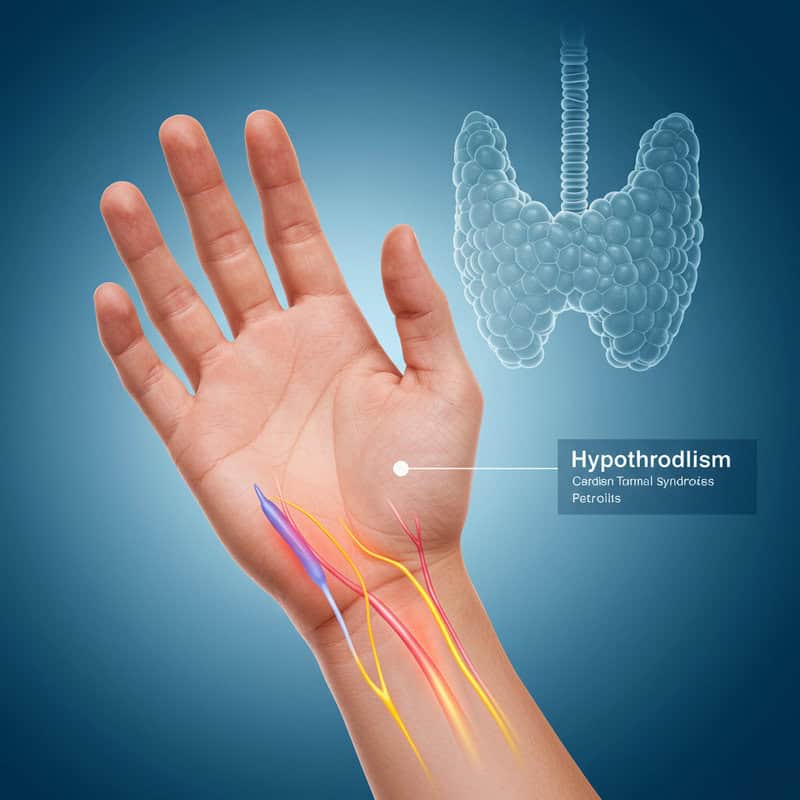
Carpal tunnel syndrome is a condition characterized by numbness, tingling, and weakness in the hand and fingers, resulting from compression of the median nerve as it passes through the wrist. While repetitive hand movements and certain occupations are well-known causes, hypothyroidism is a frequently overlooked contributor. Low thyroid hormone levels can lead to fluid retention and swelling of the tissues surrounding the carpal tunnel, increasing pressure on the nerve and triggering symptoms similar to those caused by overuse or repetitive strain.
For example, someone might develop tingling or numbness in their fingers despite not engaging in activities commonly associated with carpal tunnel syndrome, such as typing or assembly line work. According to the Johns Hopkins Medicine, people with hypothyroidism are at increased risk for carpal tunnel syndrome, yet this connection is often missed during initial evaluations.
If you experience persistent symptoms of carpal tunnel syndrome—such as numbness, tingling, or weakness in the hands—without clear occupational or mechanical causes, discuss the possibility of thyroid dysfunction with your healthcare provider. Thyroid testing can help identify an underlying hormonal imbalance and guide appropriate management of both conditions.
23. Slow Reflexes

Thyroid hormones are essential for maintaining normal nerve conduction and muscle response. In hypothyroidism, reduced hormone levels slow down the transmission of signals between nerves and muscles, which can result in noticeably slower reflexes. This slowing is especially apparent in deep tendon reflexes, such as the knee-jerk response, and is a classic clinical sign of advanced hypothyroidism. These changes can impact coordination, balance, and overall reaction time.
For example, someone with undiagnosed hypothyroidism might notice delayed reactions when catching a falling object or responding to sudden events, such as quickly moving out of the way of an obstacle. Friends or family might observe that the person seems to “move more slowly” or is less responsive in physical activities. According to the National Institutes of Health, prolonged or slowed reflexes are commonly identified during neurological examinations in patients with low thyroid levels.
If you or those around you observe new or worsening sluggishness in your physical responses, or if you experience a general sense of slowed movement, consider discussing these symptoms with your healthcare provider. Tracking these changes and seeking thyroid function testing can be crucial for early detection and effective treatment of thyroid-related nerve issues.
24. Unexplained Muscle Cramps

Muscle cramps—sudden, involuntary contractions or spasms—are a lesser-known but significant indicator of thyroid dysfunction, particularly hypothyroidism. Low thyroid hormone levels can disrupt the balance of electrolytes and nerve signals necessary for normal muscle function, resulting in frequent or severe cramping. These cramps may affect the legs, arms, or even the hands, and can occur during activity or at rest.
For example, athletes or physically active individuals might notice they are experiencing more frequent muscle cramps despite proper hydration, stretching, and nutrition. They may initially attribute these symptoms to overexertion or inadequate warm-ups, but the cramps persist even after adjusting their routines. According to the Cleveland Clinic, unexplained muscle cramps or aches that do not improve with typical interventions should prompt consideration of thyroid issues.
If you observe persistent or worsening muscle cramps—especially if they occur without a clear cause or are accompanied by other symptoms like fatigue, weakness, or stiffness—it is important to discuss these with your healthcare provider. Recognizing this pattern and requesting thyroid function testing can help uncover an underlying hormonal imbalance and lead to more effective management.
25. Difficulty Concentrating

Difficulty concentrating, often described as brain fog, is a frequent but underappreciated symptom of thyroid dysfunction. Both hypothyroidism and hyperthyroidism can impair attention, memory, and executive function, making it hard to stay focused on tasks or remember important details. Individuals may find themselves easily distracted, struggling to complete assignments, or losing track of conversations. These symptoms can closely resemble those of attention-deficit/hyperactivity disorder (ADHD), leading to confusion or misdiagnosis, especially in adults.
For example, someone may notice an increased tendency to forget appointments, overlook details at work, or have trouble following through on projects—issues they may not have experienced previously. They might attribute these challenges to stress, lack of sleep, or aging. According to the American Thyroid Association, cognitive and attention problems are common in both children and adults with thyroid disorders, and often improve with appropriate treatment.
If you find yourself or a loved one experiencing persistent focus problems, difficulty organizing thoughts, or a noticeable decline in cognitive performance, it is important to track these issues over time. Discussing these symptoms with a healthcare provider and considering thyroid function testing can lead to a more accurate diagnosis and effective management.
26. Hearing Loss or Tinnitus
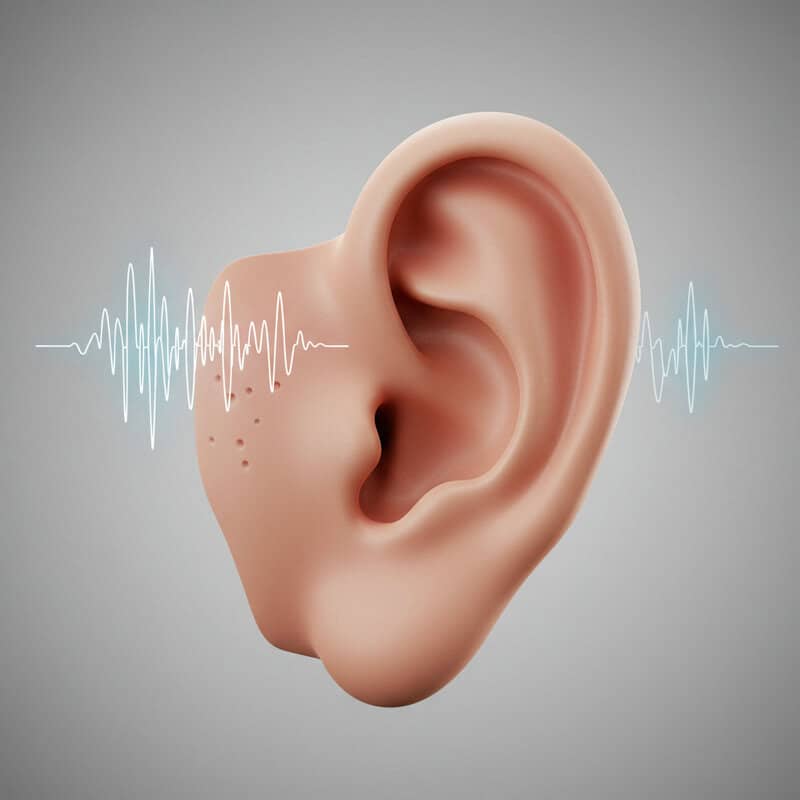
Though less common, hearing loss and tinnitus (ringing in the ears) can be overlooked symptoms of thyroid dysfunction. Both hypothyroidism and hyperthyroidism may impact the auditory system by affecting blood flow, nerve function, or the delicate structures within the ear. These changes can result in gradual or even sudden shifts in hearing acuity, or persistent ringing, buzzing, or hissing sounds that are unrelated to external noise.
For example, an individual may suddenly notice muffled hearing or a persistent high-pitched sound in one or both ears without any obvious cause, such as noise exposure or infection. They may initially attribute these symptoms to age or temporary congestion, only to find that the issues persist. According to a study referenced by the National Institutes of Health, there is a documented association between thyroid disorders and auditory symptoms, particularly in untreated or severe cases.
If you experience unexplained hearing changes or persistent tinnitus—especially when accompanied by other signs of thyroid imbalance—it is important to inform your healthcare provider. Considering thyroid function testing as part of your evaluation can help identify a treatable underlying cause and potentially restore auditory function.
27. Irregular Heartbeats

Thyroid dysfunction can significantly impact heart rhythm, leading to arrhythmias or irregular heartbeats. Hyperthyroidism, in particular, increases the risk of rapid or erratic heart rhythms, such as atrial fibrillation, while hypothyroidism can slow the heart rate and cause other rhythm disturbances. These irregularities may present as skipped beats, fluttering sensations, or a pounding heart, and can range from mild to potentially life-threatening.
For example, someone with undiagnosed hyperthyroidism might suddenly feel their heart racing or skipping beats while at rest, leading to anxiety or palpitations. Others may only notice an irregular pulse when checking their heartbeat during quiet moments or physical exams. According to the American Heart Association, thyroid disorders are a common but frequently missed cause of new-onset arrhythmias, especially in otherwise healthy adults.
If you experience ongoing irregular pulses, palpitations, or unexplained changes in your heartbeat, it is crucial to track these symptoms and seek medical advice promptly. Requesting thyroid function testing can help uncover an underlying hormonal cause, allowing for more targeted treatment and reducing the risk of serious cardiac complications.
28. High Blood Pressure
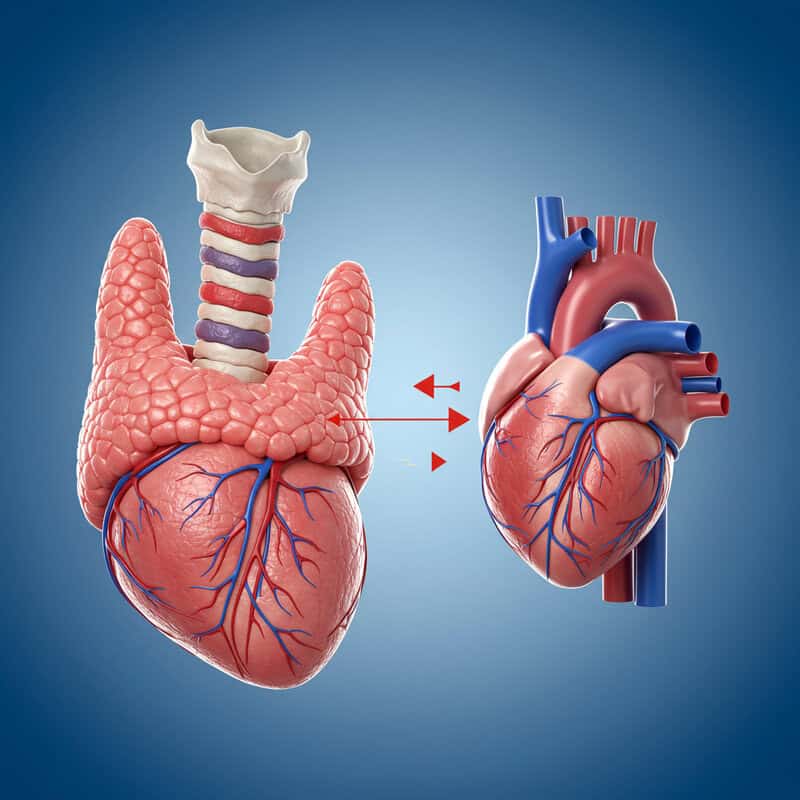
The thyroid gland plays a critical role in regulating cardiovascular function, including blood pressure. Both hypothyroidism and hyperthyroidism can contribute to high blood pressure (hypertension), albeit through different mechanisms. Hypothyroidism may cause increased peripheral resistance in blood vessels, leading to diastolic hypertension, while hyperthyroidism increases cardiac output and heart rate, raising systolic blood pressure. These changes can occur even in individuals without traditional risk factors, making thyroid dysfunction an underrecognized cause of unexplained hypertension.
For instance, a person may develop persistently high blood pressure during routine checkups, despite maintaining a healthy weight, exercising regularly, and eating a balanced diet. They may be prescribed antihypertensive medications, but the underlying hormonal issue goes undetected. According to the National Institutes of Health, thyroid disorders—especially when subtle—can significantly impact blood pressure, and routine screening should be considered in cases of unexplained hypertension.
If you or a loved one experience new or persistent high blood pressure without obvious cause, it is important to request a thyroid evaluation as part of your medical assessment. Early detection of thyroid dysfunction can lead to more effective management of both blood pressure and overall health.
29. Increased Appetite

Hyperthyroidism accelerates the body’s metabolism, causing it to burn energy at a faster rate. This heightened metabolic state often leads to a noticeable increase in appetite. Individuals may find themselves feeling hungry more frequently, eating larger portions, or craving food soon after a meal. Despite this increased food intake, some people continue to lose weight or struggle to maintain their usual weight, which can be confusing and concerning.
For example, someone may observe a sudden spike in their hunger levels—reaching for snacks throughout the day or waking in the night to eat—without any changes in physical activity or routine. Friends or family might comment on the increased frequency of meals or the inability to feel full. According to the Johns Hopkins Medicine, persistent, unexplained increases in appetite—especially when accompanied by other symptoms like weight loss, sweating, or nervousness—are classic signs of hyperthyroidism.
If you notice a significant and ongoing change in your appetite, particularly if it occurs alongside other potential signs of thyroid dysfunction, it’s important to bring this up with your healthcare provider. Documenting these changes can help guide appropriate thyroid testing and timely intervention.
30. Decreased Appetite

Hypothyroidism, or an underactive thyroid, frequently leads to a decreased appetite as metabolism slows down and the body’s energy requirements diminish. Individuals may find themselves feeling full more quickly, having little interest in food, or skipping meals altogether. This loss of appetite can be subtle and may develop gradually, making it easy to overlook or attribute to other factors.
The symptoms of decreased appetite in hypothyroidism can closely resemble those seen in depression, where individuals also often experience a loss of interest in food and eating. However, with hypothyroidism, this diminished appetite is typically accompanied by other signs such as fatigue, weight gain despite reduced food intake, and feelings of sluggishness. According to the EndocrineWeb, these appetite changes are an important but often unrecognized warning sign of thyroid dysfunction.
If you notice a sustained change in your eating habits—such as ongoing disinterest in meals, fullness after small portions, or unexplained weight changes—it’s important to track these symptoms and discuss them with your healthcare provider. Early evaluation and thyroid function testing can help distinguish between depression and hypothyroidism and guide more targeted treatment.
31. Infertility in Men
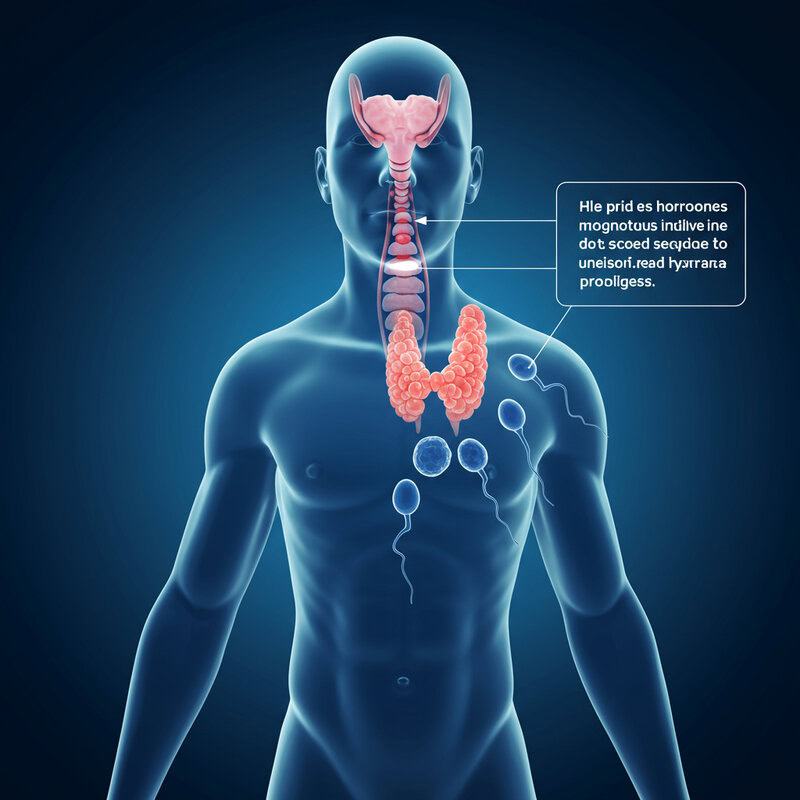
Thyroid hormones are essential not only for general health but also for male reproductive function. Both hypothyroidism and hyperthyroidism can negatively affect male fertility by disrupting hormone balance and impairing sperm production and quality. Low thyroid hormone levels may result in decreased testosterone production, reduced libido, erectile dysfunction, and, most notably, a low sperm count or poor sperm motility. Hyperthyroidism can also alter sperm morphology and overall fertility potential.
An example is a man undergoing evaluation for unexplained infertility who discovers, through semen analysis, a significantly reduced sperm count or poor motility, despite otherwise good health and lifestyle habits. According to the National Institutes of Health, thyroid dysfunction is a recognized but frequently overlooked cause of male infertility, and restoration of normal thyroid function often leads to improved sperm parameters and fertility outcomes.
If you or your partner are facing fertility challenges without an obvious cause, it is important to include thyroid function testing in the diagnostic workup. Early detection and treatment of thyroid disorders can not only enhance reproductive health but also promote overall well-being for men experiencing these issues.
32. Eye Bulging (Exophthalmos)

Eye bulging, medically known as exophthalmos, is a hallmark symptom of Graves’ disease, an autoimmune form of hyperthyroidism. In Graves’ disease, the immune system attacks tissues around the eyes, causing inflammation and swelling. This leads to the eyes protruding from their sockets, which can result in a distinctive staring appearance, dryness, irritation, or even vision changes. The degree of bulging can vary from mild to severe and often develops gradually, making it difficult for individuals to notice until the change is significant.
A real-life example involves someone who began to notice friends commenting on the “wide-eyed” look in photos, or difficulty closing their eyelids completely at night. Over time, discomfort and dryness worsened, prompting an eye exam and, ultimately, a diagnosis of Graves’ disease. According to the American Academy of Ophthalmology, early recognition of exophthalmos is crucial, as untreated eye involvement can lead to complications such as corneal damage or double vision.
If you or someone close to you observes a gradual protrusion of the eyes, persistent eye irritation, or vision changes, seek prompt medical attention. Thyroid and ophthalmological evaluation can help prevent serious consequences and guide appropriate treatment.
33. Delayed Growth in Children

The thyroid gland is essential for normal childhood growth and development, as its hormones regulate bone growth, metabolism, and brain maturation. When thyroid function is insufficient—most commonly due to hypothyroidism—children may experience delayed growth, resulting in shorter stature, delayed puberty, or slower skeletal development compared to peers. Growth delays may become apparent as a child falls below expected height percentiles on growth charts or experiences fewer growth spurts than classmates.
For example, parents may notice that their child is consistently smaller than other children of the same age or that their clothing sizes change less frequently. Teachers or coaches may comment on the child’s lack of physical development or stamina. According to the Hormone Health Network, untreated pediatric hypothyroidism can also impact intellectual development, school performance, and overall well-being.
If you observe stunted growth, delayed puberty, or other developmental concerns in your child, it is important to discuss these symptoms with a pediatrician and request thyroid screening. Early diagnosis and treatment are vital for ensuring children reach their full growth and developmental potential.
34. Difficulty Swallowing

Difficulty swallowing, or dysphagia, can be a subtle but important warning sign of thyroid problems, particularly when the gland becomes enlarged due to a goiter or thyroid nodules. As the thyroid enlarges, it can compress the esophagus or surrounding tissues, making it hard to swallow solids or even liquids. This sensation may be mild at first, such as a feeling of a “lump in the throat,” but can progress to more significant obstruction or discomfort.
One case involved a woman who noticed she often needed to drink extra water to help food go down, and sometimes felt as though pills got stuck in her throat. Over time, her symptoms worsened, prompting medical evaluation, which revealed a multinodular goiter pressing on her esophagus. According to the National Cancer Institute, persistent swallowing difficulties are a red flag for thyroid enlargement and should not be ignored, as they may also indicate more serious underlying conditions like thyroid cancer.
If you experience ongoing or worsening difficulty swallowing, hoarseness, or a sensation of tightness in the neck, seek prompt evaluation from your healthcare provider. Early assessment, including a thyroid exam and imaging, can clarify the cause and lead to timely treatment.
35. Slow Heart Rate (Bradycardia)

Hypothyroidism can significantly impact the cardiovascular system, most notably by causing a slow heart rate, known as bradycardia. Thyroid hormones help regulate the heart’s electrical system, and insufficient levels cause the heart to beat less frequently. While a slow heart rate can be normal in well-trained athletes due to increased cardiac efficiency, in those without high physical fitness, unexplained bradycardia may be a sign of underlying thyroid dysfunction.
For example, a person may begin to notice dizziness, fatigue, or shortness of breath during routine activities. When their pulse is checked, it may consistently register below 60 beats per minute, which is considered bradycardic for most adults. Unlike the healthy bradycardia seen in athletes, this slow heart rate is often accompanied by other symptoms such as cold intolerance, weight gain, or muscle weakness. According to the American Heart Association, hypothyroidism should always be considered in patients with unexplained bradycardia and associated symptoms.
If you notice persistent slowness in your pulse or new symptoms of dizziness and fatigue, it is important to monitor your heart rate and consult your healthcare provider. Thyroid function tests can help determine if hypothyroidism is the underlying cause and guide appropriate treatment.
36. Rapid Heart Rate (Tachycardia)

Hyperthyroidism, or an overactive thyroid, often leads to a rapid heart rate, medically termed tachycardia. Elevated thyroid hormone levels stimulate the heart, increasing its rate and force of contraction. This can result in a resting heart rate consistently above 100 beats per minute, even without physical exertion or emotional stress. Tachycardia can also be accompanied by palpitations, shortness of breath, or a sensation of pounding in the chest.
For example, an individual may notice their heart racing while sitting quietly or lying in bed at night. They may find it difficult to relax, experience episodes of fluttering in the chest, or develop unexplained anxiety. Unlike the temporary increase in heart rate that follows exercise or excitement, tachycardia from hyperthyroidism is persistent and can disrupt daily activities and sleep. According to the Cleveland Clinic, persistent tachycardia is a key cardiovascular sign of an overactive thyroid and should be evaluated promptly.
If you experience ongoing rapid heartbeats, especially at rest or in the absence of clear triggers, it is important to monitor your pulse and discuss these symptoms with your healthcare provider. Thyroid function testing can reveal whether hyperthyroidism is the underlying cause and guide effective treatment.
37. Tongue Enlargement

Tongue enlargement, or macroglossia, is a lesser-known but significant sign of hypothyroidism. In this condition, the tongue appears swollen, thick, or protrudes more than usual, sometimes leading to difficulties with speech, chewing, or swallowing. Macroglossia in hypothyroidism results from the accumulation of mucopolysaccharides—complex sugars that cause tissues to retain water and swell. This symptom is especially prominent in severe or untreated cases and can be observed in both children and adults.
For example, a patient may suddenly notice indentations on the sides of their tongue from their teeth, increased snoring, or problems articulating words. Parents may observe that a child’s tongue seems too large for their mouth, interfering with feeding or speech development. According to the National Institutes of Health, macroglossia can be a useful clinical clue for diagnosing hypothyroidism, particularly when it appears alongside other classic symptoms like fatigue, weight gain, or dry skin.
If you or your child notice a persistent increase in tongue size, new speech difficulties, or visible tongue scalloping, it is important to inform your healthcare provider. Early recognition and thyroid function testing can ensure timely intervention and prevent further complications.
38. Changes in Taste or Smell

Though rare, changes in taste or smell can be overlooked warning signs of thyroid dysfunction. Both hypothyroidism and, less commonly, hyperthyroidism may affect the sensory nerves or mucous membranes responsible for these senses, resulting in diminished or altered perception of flavors and odors. Symptoms might range from a mild blunting of taste (hypogeusia) or smell (hyposmia) to a complete loss (ageusia or anosmia), which can significantly impact appetite and quality of life.
These symptoms are often mistaken for other causes, such as upper respiratory infections, allergies, medication side effects, or even COVID-19. For example, someone might notice that food tastes bland, or that they are unable to smell flowers or detect household odors as they once did. According to the National Institutes of Health, thyroid dysfunction should be considered if changes in taste or smell persist and are not explained by more common conditions.
If you experience a sudden or ongoing loss or alteration in your ability to taste or smell—especially when accompanied by other thyroid symptoms—bring this to your healthcare provider’s attention. Awareness of this rare sign can lead to earlier thyroid testing and more comprehensive care.
39. Difficulty Losing Weight Despite Diet

One of the most frustrating and commonly overlooked signs of hypothyroidism is difficulty losing weight despite a healthy diet and regular exercise. Hypothyroidism slows the body’s metabolism, meaning fewer calories are burned at rest and during activity. As a result, individuals may struggle to shed pounds—even when closely monitoring their caloric intake and following evidence-based weight loss programs. This metabolic slowdown is caused by insufficient thyroid hormone production, which impairs the body’s ability to efficiently convert food into energy.
A typical scenario involves a dedicated dieter who meticulously tracks food intake, exercises consistently, and practices portion control, yet sees little or no change on the scale. This lack of progress can be discouraging and is often misattributed to aging, genetics, or simple lack of willpower. However, according to the Endocrine Society, unexplained weight loss resistance is a classic symptom of hypothyroidism and warrants further medical investigation.
If you have reached a persistent weight loss plateau despite diligent efforts, or if you notice weight gain without changes in lifestyle, consider discussing thyroid testing with your healthcare provider. Identifying and treating hypothyroidism can help restore metabolic function and support healthy weight management.
40. Restless Legs

Restless legs syndrome (RLS) is a neurological condition characterized by an uncontrollable urge to move the legs, often accompanied by uncomfortable sensations such as tingling, crawling, or aching. Thyroid dysfunction, particularly hyperthyroidism, can contribute to or exacerbate restless legs symptoms by increasing nervous system activity and muscle excitability. Hypothyroidism may also be associated with RLS through its effects on nerve health and circulation.
For example, an individual might notice an overwhelming need to move their legs at night or while sitting quietly, making it difficult to fall asleep or remain still during meetings or travel. This restlessness is often relieved temporarily by movement, but returns quickly at rest. According to the Sleep Foundation, thyroid disorders can be an underlying or contributing factor in RLS, yet this connection is frequently missed.
If you experience persistent nighttime leg movements, discomfort, or sleep disruption due to restless legs, keep track of these symptoms and mention them to your healthcare provider. Comprehensive evaluation—including thyroid function testing—can help identify the root cause, improve sleep quality, and enhance overall well-being.
41. Dry, Thinning Eyebrows

A distinct but often overlooked sign of hypothyroidism is thinning of the outer third of the eyebrows, a phenomenon known as Queen Anne’s sign. Hypothyroidism disrupts the hair growth cycle, leading to slower regeneration and eventual hair loss, particularly at the edges of the brows. The skin in this area may also become dry, flaky, or scaly, compounding the appearance of eyebrow thinning.
For example, someone may notice that their eyebrow tails have become sparse or patchy, requiring more makeup to fill in the gaps. In some cases, friends or family members may comment on the change before it’s noticed in the mirror. According to the American Academy of Dermatology Association, this specific pattern of eyebrow hair loss is a classic clue to underlying thyroid dysfunction, especially when it occurs alongside other symptoms such as fatigue, dry skin, or hair thinning on the scalp.
If you observe persistent thinning or dryness of your eyebrows, particularly at the outer edges, monitor these changes and discuss them with your healthcare provider. Early recognition and thyroid function testing can lead to prompt treatment and often reversal of the eyebrow changes.
42. Feeling Bloated

Persistent bloating can be an overlooked sign of thyroid dysfunction, especially hypothyroidism. When thyroid hormone levels are low, the entire digestive process slows down, including the movement of food through the intestines. This sluggish motility can lead to increased gas, abdominal distension, and a sensation of fullness or bloating, even after eating small amounts. Unlike dietary bloating, which is typically related to certain foods or overeating, hypothyroidism-related bloating tends to be more constant and less responsive to dietary adjustments.
For example, an individual might notice that they feel uncomfortable or “puffy” throughout the day, regardless of what they eat. They may try eliminating common culprits like dairy or gluten, but the bloating persists. According to the Cleveland Clinic, bloating and digestive discomfort are common symptoms of hypothyroidism that can be mistakenly attributed to irritable bowel syndrome or food intolerances.
If you experience ongoing bloating that does not improve with dietary or lifestyle changes and is accompanied by other symptoms like fatigue, constipation, or unexplained weight gain, discuss these issues with your healthcare provider. Thyroid function testing may reveal an underlying hormonal cause, leading to more effective treatment.
43. Numbness or Tingling in Extremities

Numbness or tingling in the hands, feet, or other extremities can be a subtle sign of thyroid dysfunction, particularly hypothyroidism. Low thyroid hormone levels can lead to fluid retention and swelling, increasing pressure on peripheral nerves. Over time, this nerve compression can cause abnormal sensations—sometimes described as “pins and needles”—in the fingers, toes, or limbs. In severe cases, untreated hypothyroidism may also contribute to peripheral neuropathy, further impairing nerve function.
For instance, an individual may notice their hands fall asleep easily during sleep or that they frequently experience tingling while typing or using handheld devices. These sensations may come and go, or gradually become more persistent. According to the Johns Hopkins Medicine, such symptoms are often mistaken for carpal tunnel syndrome or poor circulation, delaying recognition of the underlying thyroid issue.
If you develop new or worsening numbness or tingling in your extremities—especially if these symptoms are unexplained or persistent—pay close attention and discuss them with your healthcare provider. Prompt thyroid function testing can help identify the cause and guide appropriate treatment to protect nerve health.
44. Increased Risk of Miscarriage

Thyroid hormones are crucial for maintaining a healthy pregnancy, especially during the early stages when the fetus relies on the mother’s thyroid function. Both hypothyroidism and hyperthyroidism can increase the risk of miscarriage by disrupting hormonal balance, affecting the uterine environment, and impairing fetal development. Women with untreated thyroid disorders are more likely to experience recurrent pregnancy loss or complications during gestation.
For example, a woman may suffer multiple miscarriages without any apparent explanation. After comprehensive testing, she discovers that a previously undiagnosed thyroid disorder was contributing to her pregnancy difficulties. According to the American Thyroid Association, thyroid screening is recommended for women with a history of recurrent miscarriage, infertility, or other risk factors before or during pregnancy.
If you have experienced more than one miscarriage, or if you are planning to become pregnant and have a family history of thyroid disease or related symptoms, ask your healthcare provider about thyroid function testing. Early detection and treatment of thyroid imbalances can help reduce the risk of miscarriage, promote a healthy pregnancy, and improve outcomes for both mother and baby.
45. Changes in Voice Pitch
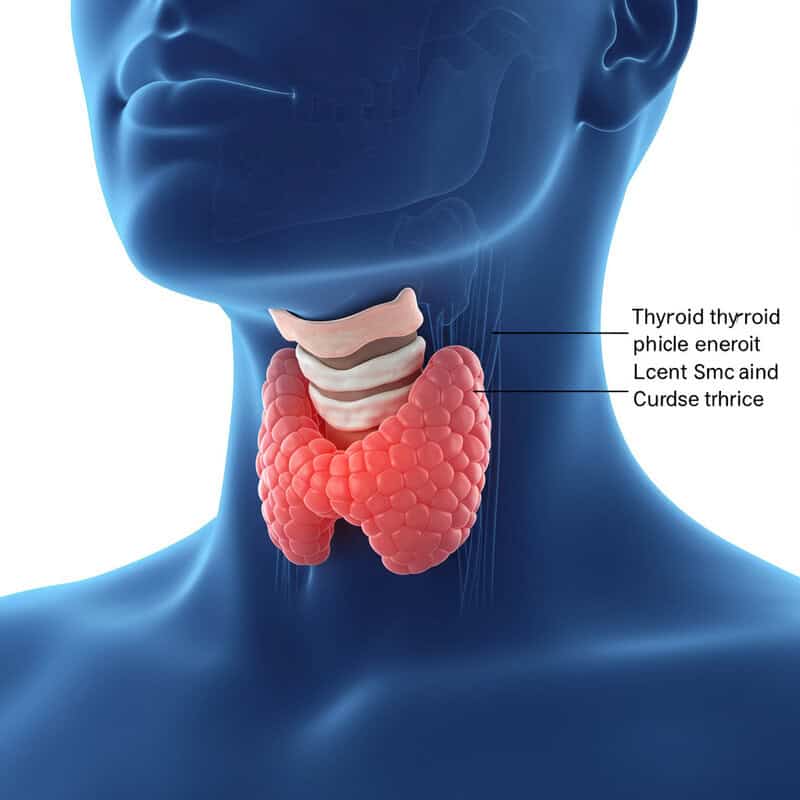
Thyroid gland enlargement or inflammation can affect the structures around the larynx (voice box), leading to changes in voice pitch. When the thyroid swells due to a goiter, nodules, or thyroiditis, it can put pressure on the recurrent laryngeal nerve and vocal cords, resulting in alterations in vocal tone or pitch. This may manifest as a deeper, hoarser, or raspier voice, or, less commonly, a higher-pitched or strained voice depending on the nature and location of the compression or inflammation.
For example, someone may notice that their singing range has changed, that their voice cracks more frequently, or that they receive comments about sounding different on the phone. In some cases, the shift in pitch may be subtle and develop gradually, making it easy to overlook. According to the American Academy of Otolaryngology-Head and Neck Surgery Foundation, persistent changes in voice quality or pitch—especially when accompanied by other symptoms like neck swelling or difficulty swallowing—should prompt an evaluation for thyroid or laryngeal issues.
If you experience ongoing changes in your voice pitch that are unexplained or worsening, be sure to mention them to your healthcare provider. Early examination and thyroid testing can help identify the cause and prevent further complications.
46. Reduced Sweating

Hypothyroidism can lead to a noticeable reduction in sweating, as slowed metabolic processes decrease the body’s overall heat production and perspiration. People with low thyroid hormone levels may observe that their skin remains unusually dry and cool, even during warm weather or physical activity. This contrasts with dehydration, where reduced sweating is typically accompanied by thirst, dark urine, and other signs of fluid loss. In hypothyroidism, the lack of sweating is due to underactive sweat glands, not insufficient fluid intake.
For instance, someone who previously perspired during exercise might find that they barely sweat, despite working just as hard or being in hot environments. Their skin may feel rough or flaky, and they may experience heat intolerance without the usual accompanying perspiration. According to the EndocrineWeb, markedly reduced sweating is a classic but often overlooked symptom of an underactive thyroid.
If you notice a persistent decline in your ability to sweat, particularly in situations where you would expect to perspire, take note of this change. When this symptom occurs alongside other signs of hypothyroidism, such as fatigue or dry skin, it is important to request thyroid function testing to determine the underlying cause.
47. Fluid Retention

Fluid retention, or edema, is a common but often overlooked symptom of thyroid dysfunction, particularly hypothyroidism. When thyroid hormone levels are low, the body’s metabolism slows and the tissues may begin to retain excess fluid. This can lead to swelling in various parts of the body, most notably the ankles, feet, hands, and face. Unlike swelling caused by injury or heart failure, thyroid-related edema is usually painless and may be accompanied by other symptoms such as fatigue and weight gain.
For example, an individual may notice that their socks or shoes leave deep indentations around their ankles, or that their rings feel tighter than usual. Swelling may be more pronounced at the end of the day or after prolonged standing. According to the Cleveland Clinic, this type of fluid retention often resolves with appropriate thyroid treatment, but can be mistaken for other causes such as diet, physical inactivity, or unrelated medical conditions.
If you observe unexplained or persistent swelling in your extremities or face, especially if it appears gradually, be sure to mention it to your healthcare provider. Thyroid function testing can help determine the cause and guide effective management to relieve edema.
48. Increased Sensitivity to Medications

Thyroid dysfunction can significantly alter the body’s ability to metabolize and respond to various medications. Both hypothyroidism and hyperthyroidism can change liver enzyme activity, gastrointestinal absorption, and renal excretion, leading to increased sensitivity to medications or unexpected side effects. For example, people with hypothyroidism may experience exaggerated sedative effects from certain drugs, while those with hyperthyroidism may become more sensitive to stimulants or cardiovascular medications.
A real-world scenario involves someone starting a new prescription at a standard dose, only to develop pronounced drowsiness, dizziness, or palpitations—side effects that are more intense than expected. They may also find that medications for blood pressure, cholesterol, or depression work differently or cause new reactions. According to the National Institutes of Health, altered drug metabolism is a well-recognized complication in thyroid disorders, and medication doses often need to be adjusted as thyroid function stabilizes.
If you notice new or severe reactions to medications, or require frequent dose changes, inform your healthcare provider. Discussing these issues can prompt thyroid function testing and guide safer, more effective medication management tailored to your individual needs.
49. Hearing a Whooshing Sound in the Neck

Hearing a whooshing sound in the neck, medically referred to as a bruit, can be an unusual but important sign of thyroid dysfunction, particularly in hyperthyroidism or Graves’ disease. This sound occurs when increased blood flow moves turbulently through the enlarged or overactive thyroid gland, creating an audible pulse or whoosh that may be noticed during quiet moments or when lying down. Physicians often detect a thyroid bruit using a stethoscope during a physical examination.
For instance, a person may hear a rhythmic swooshing in their neck when resting or turning their head, or a partner may notice the sound during close contact. This phenomenon can be startling and is easily mistaken for cardiovascular issues or even dismissed as imagination. According to the National Center for Biotechnology Information, a thyroid bruit is a classic but frequently overlooked finding in patients with Graves’ disease and should always prompt further evaluation.
If you experience or notice an unusual whooshing or pulsing sound in your neck, especially if you also have other symptoms of thyroid dysfunction such as swelling or palpitations, consult your healthcare provider. A thorough thyroid exam and function tests can help identify the underlying cause and guide appropriate treatment.
50. Recurrent Miscarriages or Pregnancy Complications

Thyroid hormones are essential for a healthy pregnancy, influencing fetal brain development, placental function, and the hormonal balance required to sustain gestation. Both hypothyroidism and hyperthyroidism can increase the risk of recurrent miscarriages and other pregnancy complications, such as preeclampsia, preterm birth, and low birth weight. While there are many potential causes of repeat pregnancy loss—including genetic, anatomical, and autoimmune factors—thyroid dysfunction is a frequently overlooked but treatable contributor.
For example, a woman who has suffered two or more consecutive miscarriages may undergo extensive evaluation for clotting disorders, uterine abnormalities, or infections, yet routine thyroid screening is sometimes omitted. According to the American College of Obstetricians and Gynecologists (ACOG), screening for thyroid disease is recommended for women with recurrent pregnancy loss or unexplained pregnancy complications, as appropriate treatment can significantly improve outcomes.
If you or someone you know is experiencing repeated miscarriages or complications during pregnancy, discuss thyroid function testing with your healthcare provider. Early detection and management of thyroid disorders can help prevent further losses and support a healthier pregnancy and baby.
Conclusion

Recognizing the often-overlooked warning signs of thyroid problems is crucial for timely diagnosis and effective treatment. Because thyroid dysfunction can manifest in subtle and varied ways, it is easy to misattribute symptoms to other conditions or normal aging. Early detection is vital to prevent complications and improve quality of life. If you experience persistent, unexplained symptoms, consider regular thyroid screening and consult a healthcare professional. For more information, visit the American Thyroid Association or the Endocrine Society for guidance and resources on thyroid health.
Disclaimer
The information provided in this article is for general informational purposes only. While we strive to keep the information up-to-date and correct, we make no representations or warranties of any kind, express or implied, about the completeness, accuracy, reliability, suitability, or availability with respect to the article or the information, products, services, or related graphics contained in the article for any purpose. Any reliance you place on such information is therefore strictly at your own risk.
In no event will we be liable for any loss or damage including without limitation, indirect or consequential loss or damage, or any loss or damage whatsoever arising from loss of data or profits arising out of, or in connection with, the use of this article.
Through this article you are able to link to other websites which are not under our control. We have no control over the nature, content, and availability of those sites. The inclusion of any links does not necessarily imply a recommendation or endorse the views expressed within them.
Every effort is made to keep the article up and running smoothly. However, we take no responsibility for, and will not be liable for, the article being temporarily unavailable due to technical issues beyond our control.





